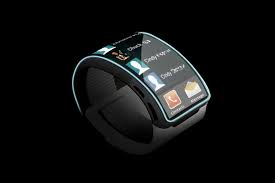Smartwatches are here!
Ajit Deshpande - September 12, 2013 - 0 Comments
 Last week was a busy week for the smartwatch segment. No less than three large corporate entities announced the launch of their individual smartwatches: Samsung (Galaxy Gear), Qualcomm (Toq) and Sony (Smartwatch 2, a sequel to their first version that was launched last year). The Galaxy Gear and the Toq are both priced at $300, whereas the Smartwatch 2 at $200 is closer to the prices of existing smartwatches such as Pebble and Basis ($150 each). Quick feature review: the Samsung Galaxy Gear has a 1.9 MP camera, a speaker/mic, has a 24 hour battery life, and can connect with other Galaxy devices. Neither the Qualcomm Toq and the Sony Smartwatch 2 have a camera or a speaker or a mic, but both have more than 3 days of battery life, and both can connect with Android devices with recent firmware versions. Qualcomm Toq uses its own Mirasol Display.
Last week was a busy week for the smartwatch segment. No less than three large corporate entities announced the launch of their individual smartwatches: Samsung (Galaxy Gear), Qualcomm (Toq) and Sony (Smartwatch 2, a sequel to their first version that was launched last year). The Galaxy Gear and the Toq are both priced at $300, whereas the Smartwatch 2 at $200 is closer to the prices of existing smartwatches such as Pebble and Basis ($150 each). Quick feature review: the Samsung Galaxy Gear has a 1.9 MP camera, a speaker/mic, has a 24 hour battery life, and can connect with other Galaxy devices. Neither the Qualcomm Toq and the Sony Smartwatch 2 have a camera or a speaker or a mic, but both have more than 3 days of battery life, and both can connect with Android devices with recent firmware versions. Qualcomm Toq uses its own Mirasol Display.
Smartwatches have in recent times been a polarizing topic for the tech world. We are still in the early adoption phase – while almost 300,000 Pebble watches have been sold so far, the first units were shipped just a few months ago. At the mass-scale, success of the smartwatch would depend on whether it can become its own consumer electronics category, and at a price of $300, that seems unlikely. Beyond being a wrist-watch replacement, the smartwatch is still just an advanced wellness device; features like mics and speakers might be useful but are not sufficient to preclude the need for a smartphone. The high price point will thus make it difficult for a user to justify the purchase of one more mobile gadget, especially given the expectation of rapid evolution in feature-sets and form-factors. Now, if this device were priced in the $100-150 range, the story could be different…
Last week’s news indicate just how low the barrier to entry in the connected device arena is, the upshot being rapid fragmentation in the market. Given this, the best chance at building a successful business in this space might go to the arms dealers – chipset players such as Qualcomm, ARM as well as Opus portfolio company GainSpan, operating systems such as Android, and the contract manufacturers for the devices. For everyone else, it’s a free for all, all while the market decides for itself!